Global Data Protection as a Service Market: By Service Type, By Deployment, By End-Use, By Region & Segmental Insights Trends and Forecast, 2024 – 2034
- Industry: Technology
- Report ID: TNR-110-1168
- Number of Pages: 420
- Table/Charts : Yes
- June, 2024
- Base Year : 2024
- No. of Companies : 10+
- No. of Countries : 29
- Views : 10147
- Covid Impact Covered: Yes
- War Impact Covered: Yes
- Formats : PDF, Excel, PPT
Data Protection as a Service (DPaaS) is a cloud-based solution that offers comprehensive data security and management services to businesses. It encompasses a range of functionalities, including data backup, recovery, encryption, and disaster recovery, all managed by a third-party provider. DPaaS is designed to protect sensitive information from threats such as cyberattacks, data breaches, and accidental loss, ensuring data integrity and availability.
By leveraging the scalability and flexibility of cloud infrastructure, DPaaS allows organizations to adjust their data protection needs according to their requirements without investing in costly on-premises hardware. Additionally, DPaaS providers often include compliance tools to help businesses adhere to regulatory standards like GDPR and HIPAA. This service model not only enhances data security but also reduces operational costs and complexity, making it a crucial component of modern IT strategies.
Increased data generation and the rising incidence of sophisticated cyberattacks, organizations are prioritizing robust data protection measures. Regulatory compliance requirements, such as GDPR, CCPA, and HIPAA, impose stringent data security standards that DPaaS can efficiently meet. The shift towards cloud computing and hybrid IT environments further necessitates scalable and flexible data protection solutions, which DPaaS effectively provides.
Additionally, the cost-efficiency and ease of management associated with DPaaS make it an attractive option for businesses aiming to protect their data without significant capital investment. As companies seek to ensure data integrity, security, and compliance, the demand for DPaaS continues to grow, underscoring its critical role in modern data management strategies.
In terms of revenue, the global data protection as a service market was worth US$ 13.7 Bn in 2023, anticipated to witness CAGR of 28.2% during 2024 – 2034.

Global Data Protection as a Service Market Dynamics
Increasing Data Breaches and Cyber Threats: The rise in sophisticated cyberattacks and data breaches is a significant driver for the DPaaS market. Organizations across various sectors face heightened security risks, prompting the need for robust data protection solutions. DPaaS offers comprehensive security measures, including encryption, multi-factor authentication, and continuous monitoring, ensuring that sensitive data is safeguarded against unauthorized access and breaches.
Stringent Regulatory Compliance Requirements: Regulatory frameworks like GDPR, CCPA, and HIPAA mandate stringent data protection standards. Non-compliance can result in hefty fines and reputational damage. DPaaS helps organizations meet these regulatory requirements by providing tools and services that ensure data privacy and compliance, including automated reporting and audit trails, reducing the burden on internal compliance teams.
Adoption of Cloud-Based Solutions: The shift towards cloud computing is key driver of the DPaaS market. As businesses migrate their operations to the cloud, the need for scalable and flexible data protection services increases. DPaaS enables seamless integration with cloud environments, offering scalable backup, recovery, and data management solutions that align with the dynamic nature of cloud infrastructures.
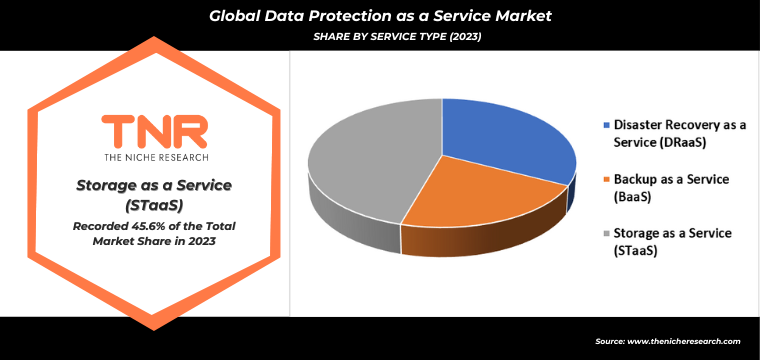
By Deployment Hybrid Cloud Segment has Garnered Major Market Share in the Global Data Protection as a Service Market during the forecasted Period.
Hybrid cloud environments, which combine on-premises infrastructure with public and private cloud services, offer flexibility and scalability but also present complex data management challenges. As organizations leverage hybrid clouds to optimize their IT operations, they face heightened risks of data breaches and compliance issues across diverse platforms. DPaaS provides a streamlined solution for these challenges by offering comprehensive data protection that spans both on-premises and cloud environments. The ability to ensure seamless data backup, recovery, and compliance across hybrid infrastructures makes DPaaS indispensable.
Furthermore, the cost-effectiveness and operational efficiency of DPaaS enable businesses to safeguard their critical data without the need for substantial in-house resources. Consequently, the need to secure data in increasingly hybrid IT landscapes is a major driver behind the growing demand for DPaaS solutions. In addition a survey found that 70% of IT decision-makers see hybrid cloud as a critical enabler for digital transformation, underlining its strategic importance. Security concerns are also driving this trend, with 67% of organizations prioritizing hybrid cloud deployments to enhance data protection and compliance capabilities. These statistics underscore the pivotal role of hybrid cloud solutions in modernizing IT infrastructure and driving business agility.
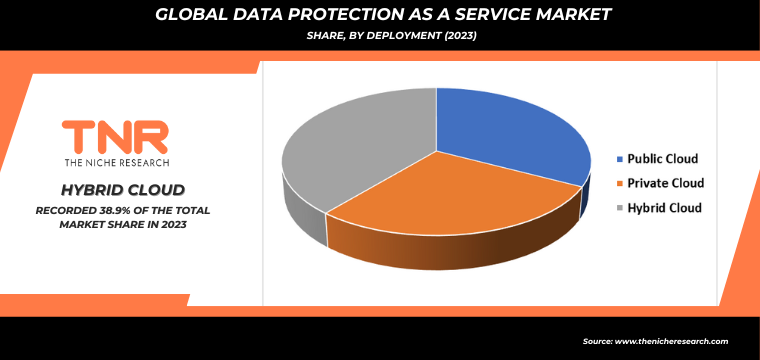
By End Use Large Enterprise had the Highest Share in the Global Data Protection as a Service Market in 2023.
Large organizations handle vast amounts of sensitive and proprietary data, the necessity for robust data protection solutions is paramount. Increasing regulatory pressures, such as compliance with GDPR, CCPA, and other international data privacy laws, compel large enterprises to adopt comprehensive data protection measures. The rise in sophisticated cyber threats and high-profile data breaches has further intensified the need for advanced security solutions that can safeguard corporate data.
Moreover, the shift towards cloud computing and hybrid IT environments requires scalable and flexible data protection strategies that DPaaS effectively provides. The cost-efficiency and ease of managing data protection through a service model appeal to large enterprises, allowing them to focus on core business operations while ensuring data integrity and security. Consequently, these factors collectively drive the burgeoning demand for DPaaS in the large enterprise sector.
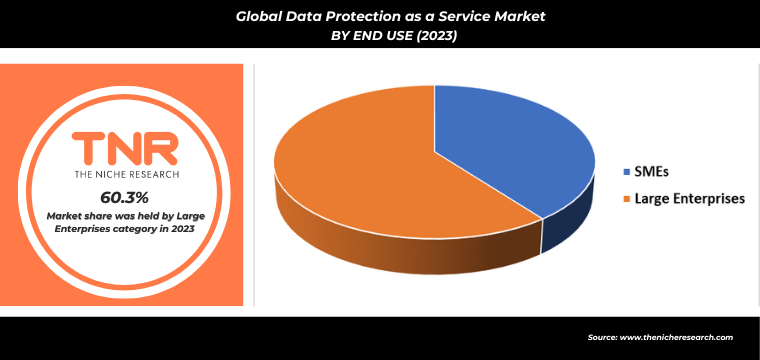
Asia-Pacific Region is Projected as the Fastest Growing Region in Data Protection as a Service Market During the Forecasted Period.
Rapid digital transformation across industries, coupled with stringent regulatory frameworks such as the General Data Protection Regulation (GDPR) and local data privacy laws, has heightened the need for robust data protection solutions. The proliferation of cyber threats and increasing instances of data breaches further underscore the urgency for comprehensive data security measures. Additionally, the rising adoption of cloud technologies and the exponential growth of data volumes necessitate scalable and efficient data protection services.
Businesses are increasingly recognizing the value of DPaaS for its cost-effectiveness, flexibility, and ability to ensure compliance while safeguarding critical information. This confluence of factors is propelling the demand for DPaaS in the Asia-Pacific, making it a pivotal component of modern data management strategies in the region. Furthermore, a survey conducted in 2022 indicated that 68% of businesses in the region prioritize data protection as a key component of their IT strategy. The increase in cyberattacks, with the Asia-Pacific experiencing 27% of global data breaches, further underscores the critical need for robust DPaaS solutions.
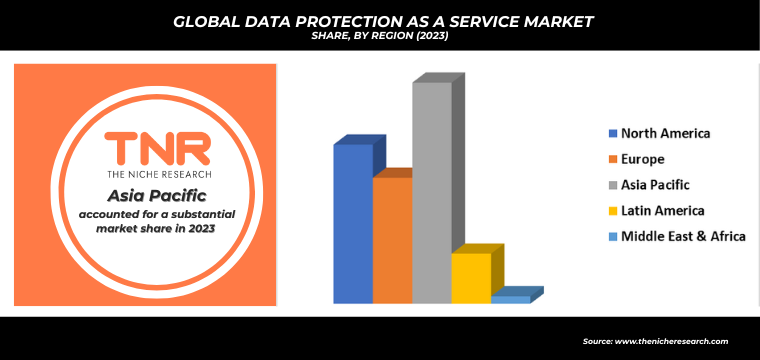
Competitive Landscape: Global Data Protection as a Service Market:
- Asigra, Inc.
- Amazon Web Services, Inc.
- Cisco Systems, Inc.
- Commvault Systems, Inc.
- Dell Inc.
- HP Development Company L.P.
- IBM
- Microsoft
- NetApp, Inc.
- Oracle
- Quantum Corporation
- Veritas Technologies
- Other Industry Participants
Global Data Protection as a Service Market Scope
| Report Specifications | Details |
| Market Revenue in 2023 | US$ 13.7 Bn |
| Market Size Forecast by 2034 | US$ 210.6 Bn |
| Growth Rate (CAGR) | 28.2% |
| Historic Data | 2016 – 2022 |
| Base Year for Estimation | 2023 |
| Forecast Period | 2024 – 2034 |
| Report Inclusions | Market Size & Estimates, Market Dynamics, Competitive Scenario, Trends, Growth Factors, Market Determinants, Key Investment Segmentation, Product/Service/Solutions Benchmarking |
| Segments Covered | By Service Type, By Deployment, By End-Use, By Region |
| Regions Covered | North America, Europe, Asia Pacific, Middle East & Africa, Latin America |
| Countries Covered | U.S., Canada, Mexico, Rest of North America, France, The UK, Spain, Germany, Italy, Nordic Countries (Denmark, Finland, Iceland, Sweden, Norway), Benelux Union (Belgium, The Netherlands, Luxembourg), Rest of Europe, China, Japan, India, New Zealand, Australia, South Korea, Southeast Asia (Indonesia, Thailand, Malaysia, Singapore, Rest of Southeast Asia), Rest of Asia Pacific, Saudi Arabia, UAE, Egypt, Kuwait, South Africa, Rest of Middle East & Africa, Brazil, Argentina, Rest of Latin America |
| Key Players | Asigra, Inc., Amazon Web Services, Inc., Cisco Systems, Inc., Commvault Systems, Inc., Dell Inc., HP Development Company L.P., IBM, Microsoft, NetApp, Inc., Oracle, Quantum Corporation, Veritas Technologies |
| Customization Scope | Customization allows for the inclusion/modification of content pertaining to geographical regions, countries, and specific market segments. |
| Pricing & Procurement Options | Explore purchase options tailored to your specific research requirements |
| Contact Details | Consult With Our Expert
Japan (Toll-Free): +81 663-386-8111 South Korea (Toll-Free): +82-808- 703-126 Saudi Arabia (Toll-Free): +966 800-850-1643 United Kingdom: +44 753-710-5080 United States: +1 302-232-5106 E-mail: askanexpert@thenicheresearch.com
|
Global Data Protection as a Service Market
By Service Type
- Disaster Recovery as a Service (DRaaS)
- Backup as a Service (BaaS)
- Storage as a Service (STaaS)
By Deployment
- Public Cloud
- Private Cloud
- Hybrid Cloud
By End Use
- SMEs
- Large Enterprises
By Region
- North America (U.S., Canada, Mexico, Rest of North America)
- Europe (France, The UK, Spain, Germany, Italy, Nordic Countries (Denmark, Finland, Iceland, Sweden, Norway), Benelux Union (Belgium, The Netherlands, Luxembourg), Rest of Europe)
- Asia Pacific (China, Japan, India, New Zealand, Australia, South Korea, Southeast Asia (Indonesia, Thailand, Malaysia, Singapore, Rest of Southeast Asia), Rest of Asia Pacific)
- Middle East & Africa (Saudi Arabia, UAE, Egypt, Kuwait, South Africa, Rest of Middle East & Africa)
- Latin America (Brazil, Argentina, Rest of Latin America)
Report Layout:
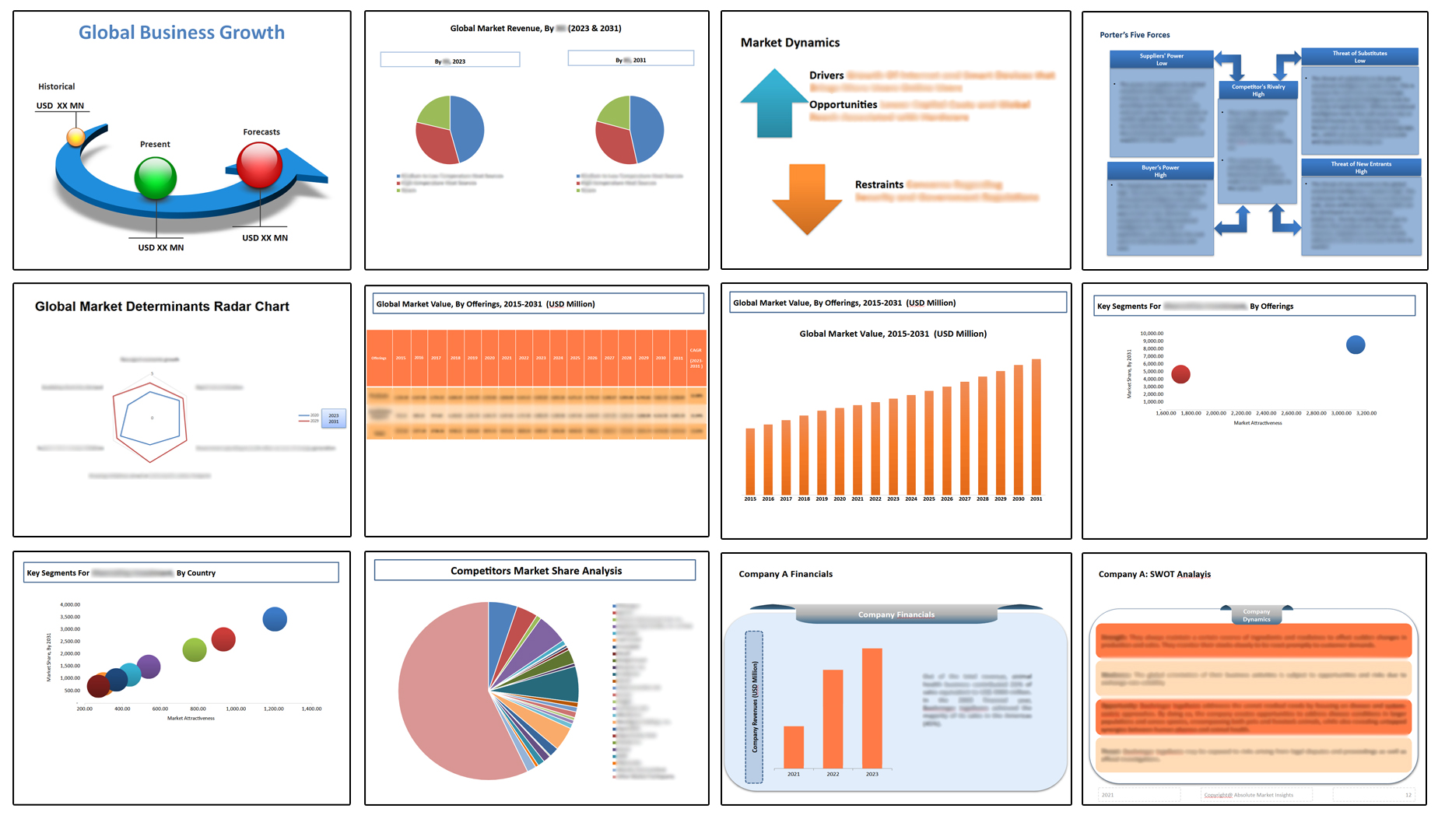
Table of Contents
**Exclusive for Multi-User and Enterprise User.
Global Data Protection as a Service Market
By Service Type
- Disaster Recovery as a Service (DRaaS)
- Backup as a Service (BaaS)
- Storage as a Service (STaaS)
By Deployment
- Public Cloud
- Private Cloud
- Hybrid Cloud
By End Use
- SMEs
- Large Enterprises
By Region
- North America (U.S., Canada, Mexico, Rest of North America)
- Europe (France, The UK, Spain, Germany, Italy, Nordic Countries (Denmark, Finland, Iceland, Sweden, Norway), Benelux Union (Belgium, The Netherlands, Luxembourg), Rest of Europe)
- Asia Pacific (China, Japan, India, New Zealand, Australia, South Korea, Southeast Asia (Indonesia, Thailand, Malaysia, Singapore, Rest of Southeast Asia), Rest of Asia Pacific)
- Middle East & Africa (Saudi Arabia, UAE, Egypt, Kuwait, South Africa, Rest of Middle East & Africa)
- Latin America (Brazil, Argentina, Rest of Latin America)
The Niche Research approach encompasses both primary and secondary research methods to provide comprehensive insights. While primary research is the cornerstone of our studies, we also incorporate secondary research sources such as company annual reports, premium industry databases, press releases, industry journals, and white papers.
Within our primary research, we actively engage with various industry stakeholders, conducting paid interviews and surveys. Our meticulous analysis extends to every market participant in major countries, allowing us to thoroughly examine their portfolios, calculate market shares, and segment revenues.
Our data collection primarily focuses on individual countries within our research scope, enabling us to estimate regional market sizes. Typically, we employ a bottom-up approach, meticulously tracking trends in different countries. We analyze growth drivers, constraints, technological innovations, and opportunities for each country, ultimately arriving at regional figures.Our process begins by examining the growth prospects of each country. Building upon these insights, we project growth and trends for the entire region. Finally, we utilize our proprietary model to refine estimations and forecasts.
Our data validation standards are integral to ensuring the reliability and accuracy of our research findings. Here’s a breakdown of our data validation processes and the stakeholders we engage with during our primary research:
- Supply Side Analysis: We initiate a supply side analysis by directly contacting market participants, through telephonic interviews and questionnaires containing both open-ended and close-ended questions. We gather information on their portfolios, segment revenues, developments, and growth strategies.
- Demand Side Analysis: To gain insights into adoption trends and consumer preferences, we reach out to target customers and users (non-vendors). This information forms a vital part of the qualitative analysis section of our reports, covering market dynamics, adoption trends, consumer behavior, spending patterns, and other related aspects.
- Consultant Insights: We tap into the expertise of our partner consultants from around the world to obtain their unique viewpoints and perspectives. Their insights contribute to a well-rounded understanding of the markets under investigation.
- In-House Validation: To ensure data accuracy and reliability, we conduct cross-validation of data points and information through our in-house team of consultants and utilize advanced data modeling tools for thorough verification.
The forecasts we provide are based on a comprehensive assessment of various factors, including:
- Market Trends and Past Performance (Last Five Years): We accurately analyze market trends and performance data from preceding five years to identify historical patterns and understand the market’s evolution.
- Historical Performance and Growth of Market Participants: We assess the historical performance and growth trajectories of key market participants. This analysis provides insights into the competitive landscape and individual company strategies.
- Market Determinants Impact Analysis (Next Eight Years): We conduct a rigorous analysis of the factors that are projected to influence the market over the next eight years. This includes assessing both internal and external determinants that can shape market dynamics.
- Drivers and Challenges for the Forecast Period:Identify the factors expected to drive market growth during the forecast period, as well as the challenges that the industry may face. This analysis aids in deriving an accurate growth rate projection.
- New Acquisitions, Collaborations, or Partnerships: We keep a close watch on any new acquisitions, collaborations, or partnerships within the industry. These developments can have a significant impact on market dynamics and competitiveness.
- Macro and Micro Factors Analysis:A thorough examination of both macro-level factors (e.g., economic trends, regulatory changes) and micro-level factors (e.g., technological advancements, consumer preferences) that may influence the market during the forecast period.
- End-User Sentiment Analysis: To understand the market from the end-user perspective, we conduct sentiment analysis. This involves assessing the sentiment, preferences, and feedback of the end-users, which can provide valuable insights into market trends.
- Perspective of Primary Participants: Insights gathered directly from primary research participants play a crucial role in shaping our forecasts. Their perspectives and experiences provide valuable qualitative data.
- Year-on-Year Growth Trend: We utilize a year-on-year growth trend based on historical market growth and expected future trends. This helps in formulating our growth projections, aligning them with the market’s historical performance.
Research process adopted by TNR involves multiple stages, including data collection, validation, quality checks, and presentation. It’s crucial that the data and information we provide add value to your existing market understanding and expertise. We have also established partnerships with business consulting, research, and survey organizations across regions and globally to collaborate on regional analysis and data validation, ensuring the highest level of accuracy and reliability in our reports.









